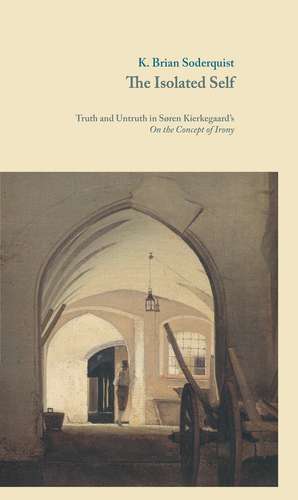The Isolated Self: Truth and Untruth in Søren Kierkegaard's On the Concept of Irony: Danish Golden Age Studies
Autor K. Brian Soderquisten Limba Engleză Paperback – 14 feb 2014
Often overlooked by Kierkegaard scholars, On the Concept of Irony—Kierkegaard’s dissertation—is in fact a foundational text that established some of Kierkegaard’s most important ideas on the self. In The Isolated Self, K. Brian Soderquist restores this important work to its proper place, offering a rare full-length study of the text that shows how and why Kierkegaard would return to the ideas he developed there throughout his entire career.
Thoroughly examining On the Concept of Irony, Soderquist uncovers the most comprehensive account of the “double movement” that is so important in Kierkegaard’s later works. Hinging on irony, the double movement describes the way existence pushes us to move from an immediate, unreflective life toward a self-developed worldview. Soderquist bores into this notion of irony, reconstructing the way it was conceived in Kierkegaard’s time by analyzing its use by related thinkers such as Hegel, Friedrich Schlegel, Johan Ludvig Heiberg, Hans Lassen Martensen, and Poul Martin Møller. Altogether Soderquist shows how Kierkegaard’s concept of irony, as demonstrated in this very early work, is crucial to understanding his pivotal thoughts on selfhood.
Preț: 194.06 lei
Preț vechi: 224.24 lei
-13% Nou
Puncte Express: 291
Preț estimativ în valută:
37.14€ • 38.82$ • 31.38£
37.14€ • 38.82$ • 31.38£
Carte disponibilă
Livrare economică 14-28 februarie
Livrare express 30 ianuarie-05 februarie pentru 61.06 lei
Preluare comenzi: 021 569.72.76
Specificații
ISBN-13: 9788763540650
ISBN-10: 8763540657
Pagini: 247
Dimensiuni: 152 x 229 x 20 mm
Greutate: 0.48 kg
Editura: Museum Tusculanum Press
Colecția Museum Tusculanum Press
Seria Danish Golden Age Studies
ISBN-10: 8763540657
Pagini: 247
Dimensiuni: 152 x 229 x 20 mm
Greutate: 0.48 kg
Editura: Museum Tusculanum Press
Colecția Museum Tusculanum Press
Seria Danish Golden Age Studies
Notă biografică
K. Brian Soderquist is a lecturer in the faculty of theology at the University of Copenhagen. He is coeditor of Kierkegaard’s Journals and Notebooks.
Cuprins
Abbreviations
Introduction: What is Irony in On the Concept of Irony?
An Orientation in the Research Tradition
Reconstructing a Lost Historical Horizon
Closure, Openness, and a Reconciliation with Actuality
SOCRATES AND THE HISTORICAL APPEARANCE OF IRONY
1. Contemplative History: A Methodology for Dual Purposes
Hegel’s Speculative History
Kierkegaard’s Contemplative History
2. Kierkegaard’s Nihilistic Socrates
Socrates’ Place in World-History
Socrates’ Abstract Personality
3. Irony Defined: The Isolated Subject
“Irony is Isolation”
Historical Actuality and Absolute Nothingness
ROMANTIC IRONY AND AESTHETIC SALVATION
4. Schlegel’s Aesthetic Salvation: A Reconciliation with Actuality
Schlegelian Irony
Lucinde: A Guide to Selfhood
5. Kierkegaard’s Critique of Romanticism: The Closed Self
Hegel on Romantic Irony
Poul Martin Møller on Irony and Selfhood
Kierkegaard’s Critique(s)
6. Irony, Humor, and the Religious Self
A Local Interpretation of Irony and Humor
The Problem of Irony in Kierkegaard’s Journals
7. The Ghost of Irony in Kierkegaard’s Authorship
A Glance at the Foregoing Chapters
The Discussion of Irony Recast
Bibliography
Index of Persons
Index of Subjects
Introduction: What is Irony in On the Concept of Irony?
An Orientation in the Research Tradition
Reconstructing a Lost Historical Horizon
Closure, Openness, and a Reconciliation with Actuality
SOCRATES AND THE HISTORICAL APPEARANCE OF IRONY
1. Contemplative History: A Methodology for Dual Purposes
Hegel’s Speculative History
Kierkegaard’s Contemplative History
2. Kierkegaard’s Nihilistic Socrates
Socrates’ Place in World-History
Socrates’ Abstract Personality
3. Irony Defined: The Isolated Subject
“Irony is Isolation”
Historical Actuality and Absolute Nothingness
ROMANTIC IRONY AND AESTHETIC SALVATION
4. Schlegel’s Aesthetic Salvation: A Reconciliation with Actuality
Schlegelian Irony
Lucinde: A Guide to Selfhood
5. Kierkegaard’s Critique of Romanticism: The Closed Self
Hegel on Romantic Irony
Poul Martin Møller on Irony and Selfhood
Kierkegaard’s Critique(s)
6. Irony, Humor, and the Religious Self
A Local Interpretation of Irony and Humor
The Problem of Irony in Kierkegaard’s Journals
7. The Ghost of Irony in Kierkegaard’s Authorship
A Glance at the Foregoing Chapters
The Discussion of Irony Recast
Bibliography
Index of Persons
Index of Subjects
Recenzii
“Standing at the beginning of Kierkegaard’s authorship, yet not avowedly belonging to the authorial project itself, On the Concept of Irony is often found as a mere footnote within Kierkegaard scholarship. In this engaging book, K. Brian Soderquist brings Kierkegaard’s Magister dissertation to the fore and develops a compelling case for treating On the Concept of Irony ‘as a prism through which to illuminate Kierkegaard’s authorship as a whole.’”









